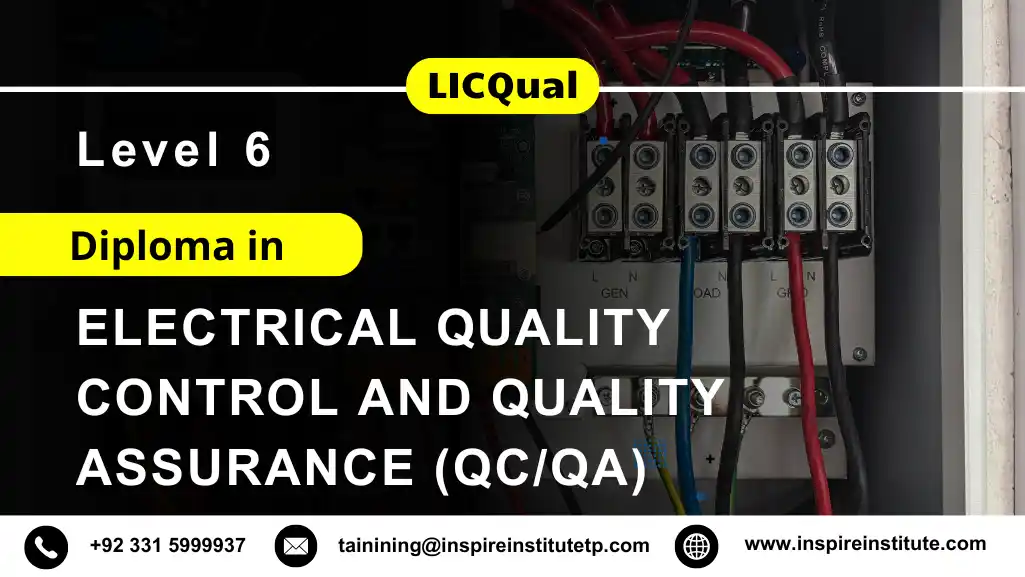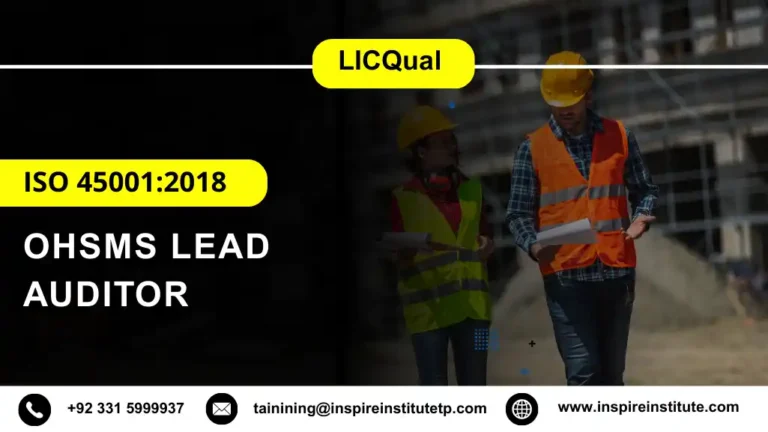LICQual Level 6 Diploma in Electrical Quality Control and Quality Assurance QC/QA
The LICQual Level 6 Diploma in Electrical Quality Control and Quality Assurance (QC/QA) is a comprehensive qualification designed for professionals aiming to specialize in the quality management aspects of electrical engineering projects. This diploma provides in-depth knowledge and practical skills in quality control procedures, inspection techniques, compliance standards, and assurance systems essential for ensuring safety, efficiency, and regulatory compliance in electrical installations and systems. Ideal for engineers, technicians, and quality inspectors, the program equips learners with the tools to lead, audit, and implement effective quality management systems within the electrical industry, aligning with international standards and industry best practices
Why Choose this Qualification
Why Choose the LICQual Level 6 Diploma in Electrical Quality Control and Quality Assurance (QC/QA)?
- Industry-Relevant Skills: This course is tailored to meet the current demands of the electrical industry, focusing on real-world quality control and assurance practices that employers value.
- Career Advancement: Holding a Level 6 diploma demonstrates a high level of expertise, opening up opportunities for senior roles such as QA/QC Engineer, Electrical Inspector, or Quality Manager.
- International Recognition: LICQual qualifications are recognized globally, enhancing your credibility and employability in both local and international job markets.
- Compliance and Safety Focus: The program emphasizes compliance with international standards (like IEC, ISO, and NEC), helping professionals ensure safety and avoid costly errors or legal issues on projects.
- Comprehensive Curriculum: The course covers a wide range of topics—from inspection and testing to documentation and audit processes—providing a well-rounded education in electrical quality management.
- Practical Application: Designed by industry experts, the curriculum integrates practical knowledge and real-world case studies, making it directly applicable to your day-to-day job.
- Flexible Learning Options: Many providers offer this course with flexible schedules or online formats, making it easier for working professionals to upskill without interrupting their careers.
Choosing this course is an investment in your technical competence, career growth, and commitment to delivering high-quality, safe, and compliant electrical systems.
Course Overview
LICQual UK Awarding Body
Course Level: Level 6
Average Completion Time:
4-12 Months
Study Units: 6 Units
Evidence & Assignment Based
Qualification Structure
The LICQual Level 6 Diploma in Electrical Quality Control and Quality Assurance QC/QA comprises 6 mandatory units making a combined total of 120 credits, 480 Guided Learning Hours (GLH) for the completed qualification
Mandatory Units
Who Should Take This Course
This diploma is ideal for professionals who are directly or indirectly involved in the quality management of electrical projects. It is particularly suited for:
- Electrical Engineers – Looking to specialize in quality control and assurance practices within construction, industrial, or power sectors.
- Quality Control/Assurance Engineers (QC/QA) – Who want to formalize their experience and gain a recognized qualification to advance into senior QA/QC roles.
- Site Supervisors and Project Managers – Who oversee electrical work and want to ensure quality and compliance with international standards and client specifications.
- Electrical Inspectors and Auditors – Who are responsible for inspecting, testing, and certifying electrical systems and components.
- Technicians and Foremen – Wishing to upgrade their knowledge and move into quality assurance roles or leadership positions on technical teams.
- HSE Officers and Compliance Managers – Who work closely with electrical systems and need a deeper understanding of electrical quality control for integrated safety and quality practices.
- Fresh Graduates in Electrical Engineering – Seeking to specialize early in a growing and critical field within the electrical and construction industries.
This course is suitable for both experienced professionals looking to enhance their credentials and those aiming to transition into QC/QA roles within the electrical field.
Course Benefits
Benefits of the LICQual Level 6 Diploma in Electrical Quality Control and Quality Assurance (QC/QA):
- Enhanced Professional Credibility
This diploma demonstrates your expertise in electrical quality control and assurance, earning you recognition as a qualified and competent professional in the industry. - Career Advancement Opportunities
With this advanced qualification, you become eligible for higher-level roles such as QC/QA Engineer, Electrical QA/QC Manager, or Project Quality Supervisor. - Global Recognition
LICQual certifications are internationally recognized, increasing your employability across different countries and sectors. - Strong Knowledge of International Standards
You’ll gain a thorough understanding of key standards like ISO, IEC, and NEC—critical for ensuring project compliance and safety. - Improved Job Performance
The course equips you with practical skills to identify, assess, and resolve quality-related issues on-site, improving the overall efficiency and reliability of electrical systems. - Increased Earning Potential
Specialized qualifications in QA/QC often lead to higher-paying positions due to the added value and responsibility they bring to projects. - Broader Career Options
Graduates can work in a variety of sectors, including construction, oil and gas, manufacturing, power generation, and facility management. - Leadership and Management Skills
The program also develops essential skills in team leadership, documentation, auditing, and reporting—key for managing quality systems and teams. - Commitment to Safety and Compliance
You’ll be trained to ensure all electrical work meets safety codes and regulations, reducing the risk of accidents, failures, and legal issues. - Lifelong Learning and Development
This qualification opens the door to further certifications or studies in specialized areas like electrical safety, project management, or quality auditing.
By completing this diploma, you’ll not only deepen your technical expertise but also significantly boost your career trajectory in the electrical and quality assurance fields.
Eligibility Criteria
To be eligible for enrollment in the LICQual Level 6 Diploma in Electrical QC/QA, applicants must meet the following criteria:
Minimum Age: Applicants must be at least 16 years old at the time of enrollment.
Educational Qualifications:
A minimum of a Level 4 or Level 5 qualification in electrical engineering, quality management, or a closely related field is required. Applicants holding a bachelor’s degree in electrical engineering, quality assurance, or a similar discipline are also eligible.
Professional Experience:
While prior work experience is not strictly mandatory, preference will be given to candidates with at least 2 years of relevant experience in electrical engineering, quality control, or quality assurance.
English Language Proficiency:
Since the course is delivered in English, applicants must demonstrate sufficient proficiency in the language. This can be proven through a recognized English qualification such as IELTS with a minimum score of 6.0 or an equivalent standard English proficiency test.
These entry requirements ensure that learners are well-prepared to engage with the course content and succeed in the program.
The Qualification Process
Here is a step-by-step guide to help you understand the entire journey from pre-registration to certification:
- Self-Assessment:
Begin by evaluating your eligibility for the course. Ensure you meet the entry requirements, such as relevant qualifications or professional experience, as outlined for the program. - Registration:
Complete your registration by submitting the required documents, including a scanned copy of a valid ID, and pay the necessary registration fee. This is your first official step in the qualification process. - Induction:
An assessor will conduct an induction session to verify your eligibility and introduce you to the evidence requirements. During this stage:- If the assessor finds that you meet all the necessary criteria, you will proceed to the next step.
- If you do not meet the entry requirements, your registration will be canceled, and your fee will be refunded.
- Evidence Submission:
Based on the assessment criteria, you will need to submit evidence demonstrating your knowledge and competence. Consult with your assessor if you need clarification on the type and nature of the evidence required. This evidence could include assignments, projects, case studies, or professional experiences related to sustainability management. - Feedback and Revision:
The assessor will review your submitted evidence and provide feedback. Evidence that meets the required criteria will be marked as “criteria met.” If there are any gaps, the assessor will highlight them, and you will need to address those gaps by revising and resubmitting the evidence. - Competence Evidence:
Submit your final evidence demonstrating that you have successfully achieved all the learning outcomes. The assessor will mark your submission as “Criteria met” once everything is up to standard. - Internal Quality Assurance (IQA):
After your evidence is approved by the assessor, the Internal Quality Assurance Verifier (IQA) will review it to ensure that the assessment was carried out consistently and according to LICQual standards. - External Verification:
The IQA then presents your portfolio to LICQual External Quality Assurance Verifiers (EQA) for final confirmation. The EQA may contact you directly to verify the authenticity of your evidence. - Certification:
Once all internal and external checks are completed to satisfaction LICQual will issue your official certificate, confirming that you have successfully achieved the qualification.
This comprehensive process ensures that learners demonstrate all necessary competencies and meet the high standards required for the LICQual Level 6 Diploma in Electrical Quality Control and Quality Assurance QC/QA.







